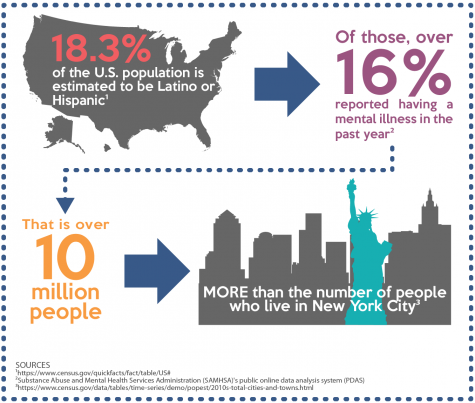Opinion: “Hispanic Parents, Mental Health Exists”
September 7, 2021
Mental health has become one of the biggest issues of our generation. It has affected many teenagers for different reasons: school, work, family, or other personal issues.
Normally, we can go to our parents or a trusted adult to talk about what’s going on and get help, but when it comes to Hispanic or Latino parents, it’s a whole different story.
Typically, when we’re feeling down, we tend to stay in our rooms and not talk to our parents. As soon as they see us laying in bed or on our phone, they start to complain that we’re lazy and don’t do anything around the house.
However, what they don’t understand is what goes on in our mind and what we went through that day or recently, both mentally and physically.
According to Cleveland Clinic, “Some Latinos view mental illness as a sign of weakness. Others think it’s a personal issue to be kept quiet. Others fear being labeled ‘loco,’ Spanish for ‘crazy.’” In the Latino community, it’s uncommon for parents of the older generation to understand mental illnesses and issues. Most of the time, when we come up to them about our problems, they invalidate our feelings by giving us a lecture and telling us that we’re overthinking or making it up.

“18.3% of the U.S. population is estimated to be Latino or Hispanic. Of those, over 16% reported having a mental illness in the past year. That is over 10 million people,” stated Mental Health America. Although ten million people is a lot, there are still millions of hispanics who have not reported someone with an illness.
That is one less person who has not received any help. Why? Because of what their parents and families think of them.
“It’s really difficult. Having parents who don’t believe in anxiety or depression or anything for that matter of fact can be draining. They see it as being overdramatic; it can be extremely disappointing to try to get better when you don’t have a support system to do exactly that, support you,” said Rangeview Senior Maria Longoria Sierra.
A support system plays a huge role in a teenagers life. When they are going through some issues, they should be able to go to their parents who love and support them, regardless of what the problem is. “This heavily affects hispanic kids in the long run because feelings are seen as invalid,” continued Longoria.
In some families, since teenagers don’t have someone to go to with parents of this mentality, it’s harder to deal with personally and emotionally.
“It makes teenagers feel like they shouldn’t bring the issue up or make them feel like they should deal with the problem alone,” said Senior Josue Gardie. Regardless of age, gender, or ethnicity, anyone should be able to speak about their issues and get the help they need.
Now why is it a struggle? Why can’t some Hispanic parents have an open mind about these issues?
“It’s harder for Hispanics to understand mental illnesses because we all grew up differently. Maybe even our parents never got attention when it came to their mental health and think that it’s okay to not worry about ours,” said Junior Johana Alvarado Gonzalez. Could it be possible that the older generation had their own issues and never received help? Is this their way of telling us that we don’t need help and it’ll resolve on its own?
Alvarado continued, “They make it seem like it doesn’t matter. They always come up with excuses when it comes to listening to our thoughts, so how are they going to understand if they don’t bother to listen.”

Overall, no one should have to go through their issues alone. Talking to a friend or a trusted adult can help. It’s important to understand that our feelings and what we’re going through matter and should be heard.
Go to https://www.samhsa.gov/find-help/national-helpline if you’re struggling with mental health issues or illnesses, or call 1-800-662-4357.












